If you didn't grow up in the rural Midwest, perhaps you don't know precisely what it's like to dream your way out.
Growing up in Ohio, we would sit in the window of my best friend's attic bedroom and gaze upon the cornfields. The few windows at the high school looked out over cornfields. To leave town, a not easy feat, required miles and miles of driving past cornfields. I can measure time by the height of the corn; "Oklahoma" was right.
But perhaps no film encapsulates that longing to escape quite like "The Wizard of Oz." Metro-Goldwyn-Mayer's 1939 adaptation of the L. Frank Baum children's classic "The Wonderful Wizard of Oz" was an instant critical success, though the high production costs of the lavish musical fantasy (in Technicolor!) meant the film initially lost money.
In "A League of Their Own," Prime Video's own adaptation of the 1990s film, the women's baseball team attends a theater rerelease of "The Wizard of Oz," as do the characters Max and Clance. They all have their own interpretations. The film has different meanings in their lives. For most of the Peaches, it's the ultimate fantasy and escape, until a horrifying incident that makes the Technicolor brightness feel false in comparison. One character sees it as an elaborate indictment on society and its exploitation of the working classes.
But along with those takes and the film's strong place in queer history and culture, there may be no better story to represent wanting more.
In case you've been under the rainbow: "The Wizard of Oz" tells the story of Dorothy, a young girl in Kansas, who runs away from her farm home after her dog bites a neighbor who plans to take the dog. Dorothy gets stuck in a tornado that lifts her, the house she's in and her dog Toto, and lands them (apparently) squarely on a witch in a magical land called Oz. Dorothy meets a delightful cast of characters to aid her quest to get back to Kansas, and a few, like the Wicked Witch of the West, who interfere.
Why does "A League of Their Own" devote so much of the episode titled "Stealing Home" to the film? The star of the team, Carson (Abbi Jacobson) is from Idaho, has a penchant for gingham, and a running joke on the show is that she's not actually from a farm. She does show up to tryouts in coveralls that read "Jensen's Seed" on the back. But the story of the show is a story of Middle America; the teams of the real-life All-American Girls Professional Baseball League were all located in the Midwest.
So often the Midwest functions as shorthand in fiction, a quick way to represent backwardness or innocence, ignorance or rurality. Carson gets her unfashionable hair cut right away, a sure sign that we're not in Kansas anymore.
But this is a queer "A League of Their Own" (thank Glinda!) and the movie's place in queer history is long and detailed. We have a rainbow. We have incredible costumes like the glittering pink of Glinda the Good Witch, who arrives in a bubble like a giant soap sud. As Carmen Phillips writes on Autostraddle: "The Stonewall Riots happened on the same day as Judy Garland's funeral, a fact seen as a chance of coincidence by some and a grand myth-making origin story by others." And there then is the "friend of Dorothy" phrase, which Carson is asked upon attempting to follow pitcher Lupe into what Carson doesn't realize is an underground gay bar. It's the password. The expression can be traced back to WWII, the time of "A League of Their Own," and while its origins are not definitive, "The Wizard of Oz" seems like the likeliest contender.
The notion that we contain multitudes is not new, but the idea that there's a secret world waiting for you is especially meaningful for queer characters.
Dorothy herself, Judy Garland, quickly went on to be, not simply a gay icon, but a supporter of the gay community, defending her gay fans publicly early and passionately, saying in a 1967 interview: "I'll be damned if my audience is mistreated." She had the camp aesthetic, gave larger-than-life performances, and some in the queer community saw her struggles as parallels to their own.
"The Wizard of Oz" is as much Garland's story as it is Dorothy's. It was Garland's big break. She was teenager in the film (some producers believed her to look too mature for the role and her chest was bound), and like Dorothy, she would soon emerge into a world with magic both pure (adoring crowds, beloved roles) as well as dark (drugs, alcohol and abuse).
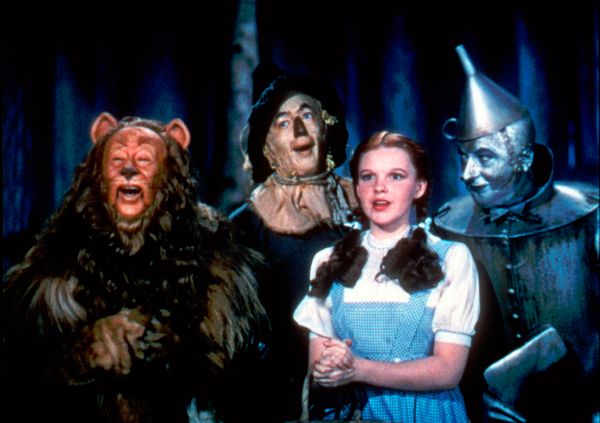 In this 1939 file photo originally released by Warner Bros., from left, Bert Lahr as the Cowardly Lion, Ray Bolger as the Scarecrow, Judy Garland as Dorothy, and Jack Haley as the Tin Woodman, are shown in a scene from "The Wizard of Oz." A Cowardly Lion costume from the classic film "The Wizard of Oz" is up for sale. Lahr's costume will be auctioned with other Hollywood items Monday, Nov. 24, 2014, in New York by Bonhams, said a spokesman for the owner, James Comisar. (AP Photo/Warner Bros., file) (AP
In this 1939 file photo originally released by Warner Bros., from left, Bert Lahr as the Cowardly Lion, Ray Bolger as the Scarecrow, Judy Garland as Dorothy, and Jack Haley as the Tin Woodman, are shown in a scene from "The Wizard of Oz." A Cowardly Lion costume from the classic film "The Wizard of Oz" is up for sale. Lahr's costume will be auctioned with other Hollywood items Monday, Nov. 24, 2014, in New York by Bonhams, said a spokesman for the owner, James Comisar. (AP Photo/Warner Bros., file) (AP
One of the most wonderful aspects of "A League of Their Own" is that the story is not simply one woman's journey but an ensemble piece, much like the crew of Oz skipping down the road. Of course, we have a lead: the awkwardly lovable Carson, but the supporting cast radiates with power, want and heart including Clance (Gbemisola Ikumelo), Lupe (Roberta Colindrez) and Jess (Kelly McCormack). Carson is our Dorothy certainly, the rural farm girl (not from a farm) suddenly finding herself in a magic place.
Or is she? Max (Chanté Adams) is a strong contender for Dorothy. She's the one who doesn't get to go to Oz after all, denied a chance even to try out for the All-American Girls League because she's Black. There is no longing like the look in Max's eyes, stung with the knowledge that she's better than the other women but it will not matter due to the segregated teams.
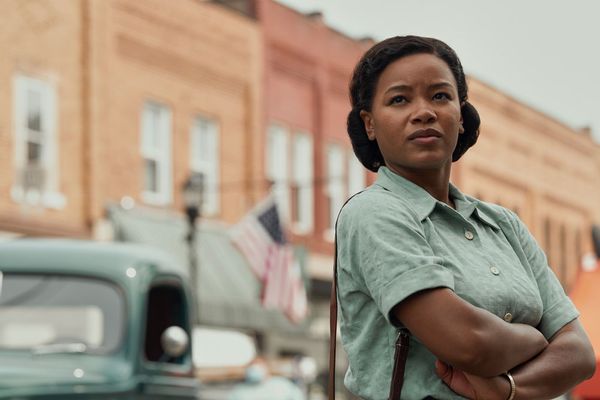 A League of Their Own (Anne Marie Fox/Prime Video)But Esti (Priscilla Delgado) has longing too. She's got the long dark pigtails of Dorothy. The Cuban player, the youngest on the team, struggles, not knowing the language of this strange new world. And Esti's tears and hard-won English sentence when the team comes back from seeing "The Wizard of Oz," having attended the movie without her even though she really wanted to go, left me in tears as well. It's a small, totally devastating moment of feeling like an outsider.
A League of Their Own (Anne Marie Fox/Prime Video)But Esti (Priscilla Delgado) has longing too. She's got the long dark pigtails of Dorothy. The Cuban player, the youngest on the team, struggles, not knowing the language of this strange new world. And Esti's tears and hard-won English sentence when the team comes back from seeing "The Wizard of Oz," having attended the movie without her even though she really wanted to go, left me in tears as well. It's a small, totally devastating moment of feeling like an outsider.
If we're talking braids, though, Shirley (Kate Berlant) could be Dorothy too. Her anxieties certainly hold her back, experiencing life in black and white for a long time, not in color like the other women who take more chances. I'm going to nominate Greta (D'Arcy Carden) for the Scarecrow. She's Carson's guide to quite a lot, including navigating identity and life as a queer woman. She's loyal (mostly to Jo) but like the Scarecrow, she can be burned. She doesn't know which way to go, torn in pieces by her heart and her experience which has jaded and traumatized her, keeping her from fully experiencing love.
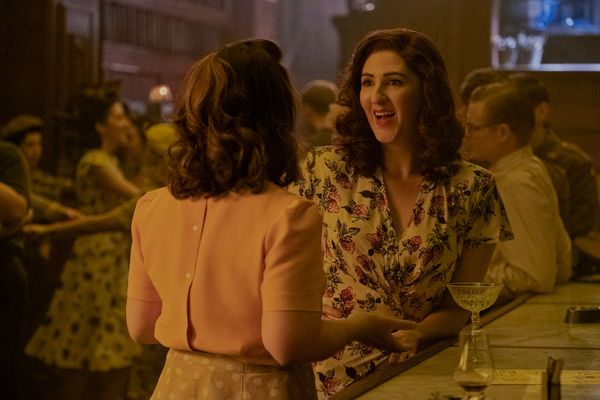 A League of Their Own (Nicola Goode/Prime Video)On the heart subject, perhaps Jess is our Tin Man. As played by the superb McCormack, she's competitive, cool and collected. She's also steadfast, quietly loyal and cares, cares enough to learn Spanish for Esti — the only member of the team to actually do so. Maybe Lupe is the Cowardly Lion, or maybe Jo is: both tough on the outside, but nurturing sweethearts once you've broken through their defensive roars. And perhaps Clance, one of my favorite characters in a field of outstanding performances, is Glinda. Or Bert (Lea Robinson) is. Both want only good things for their Dorothy.
A League of Their Own (Nicola Goode/Prime Video)On the heart subject, perhaps Jess is our Tin Man. As played by the superb McCormack, she's competitive, cool and collected. She's also steadfast, quietly loyal and cares, cares enough to learn Spanish for Esti — the only member of the team to actually do so. Maybe Lupe is the Cowardly Lion, or maybe Jo is: both tough on the outside, but nurturing sweethearts once you've broken through their defensive roars. And perhaps Clance, one of my favorite characters in a field of outstanding performances, is Glinda. Or Bert (Lea Robinson) is. Both want only good things for their Dorothy.
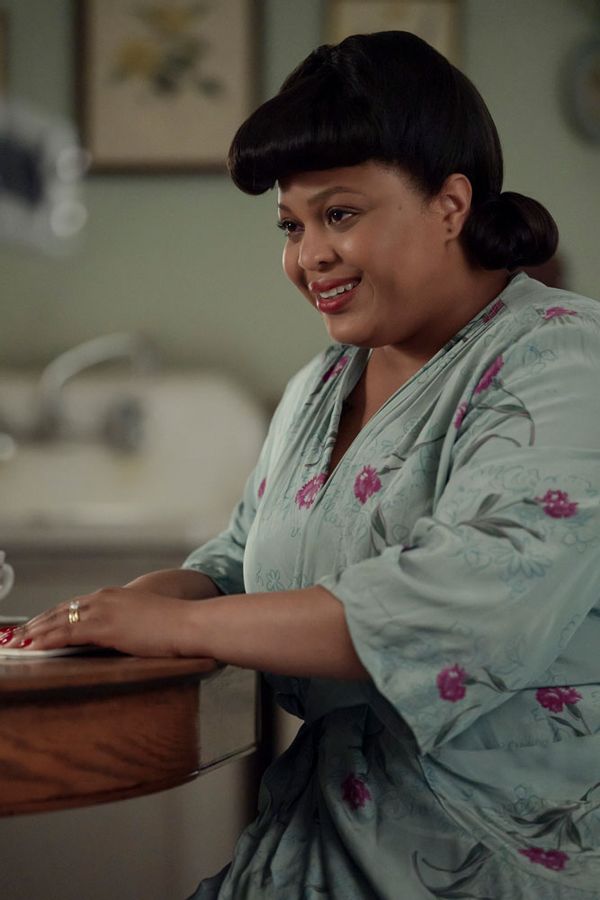 A League of Their Own (Anne Marie Fox/Prime Video)I think we have a clear Wizard in this Oz though, and that's Vi. The owner of the gay bar Carson stumbles into, Vi, as played by Rosie O'Donnell (after her heartbreaking turn as Carrie in "The L Word: Gen Q") is classy, cool and kind. Pay all attention to this "man behind the curtain" who makes the magic happen for her customers. While she is part of what makes life Technicolor for Carson/Dorothy, like the great and powerful Oz, she brings them home.
A League of Their Own (Anne Marie Fox/Prime Video)I think we have a clear Wizard in this Oz though, and that's Vi. The owner of the gay bar Carson stumbles into, Vi, as played by Rosie O'Donnell (after her heartbreaking turn as Carrie in "The L Word: Gen Q") is classy, cool and kind. Pay all attention to this "man behind the curtain" who makes the magic happen for her customers. While she is part of what makes life Technicolor for Carson/Dorothy, like the great and powerful Oz, she brings them home.
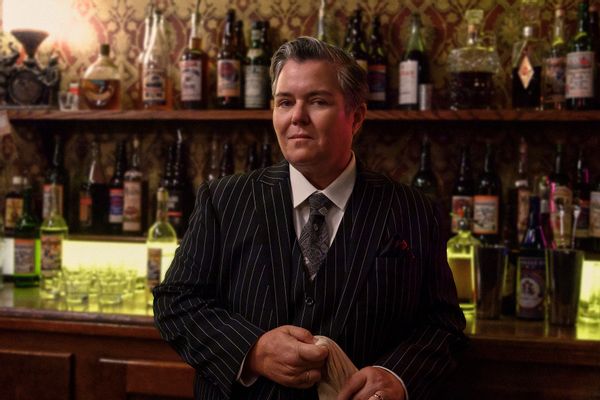 A League of Their Own (Anne Marie Fox/Prime Video)The point is: everyone is someone else. And doubly so, as in "The Wizard of Oz," Dorothy wakes up not knowing if her time in Oz was real or a dream, but people from her actual life, like farmhands, show up as other characters in Oz. "But you were there. And you."
A League of Their Own (Anne Marie Fox/Prime Video)The point is: everyone is someone else. And doubly so, as in "The Wizard of Oz," Dorothy wakes up not knowing if her time in Oz was real or a dream, but people from her actual life, like farmhands, show up as other characters in Oz. "But you were there. And you."
I always wanted her to run, not home, but on to adventure.
Perhaps it's unsurprising that "The Wizard of Oz" has turned up in other pop culture places recently too, like the Hulu mystery series "Only Murders in the Building" where Oliver's son stages a production of the story with a lot of help from his famous dad. And in the beautiful "Somebody Somewhere," where a Kansas-born woman goes home and tries to reclaim her life, to remember what she once wanted to be.
The notion that we contain multitudes is not new, but the idea that there's a secret world waiting for you is especially meaningful for queer characters at the time of "A League of Their Own": having a private identity, being forced to hide. Like Dorothy emerging into Technicolor, the world is in black and white until you open the curtains, until you can be you.
Want a daily wrap-up of all the news and commentary Salon has to offer? Subscribe to our morning newsletter, Crash Course.
There is so much longing in "A League of Their Own." Longing for the women athletes to be taken seriously. Longing to join a team. Or have a comic published. Or find real love. Or even to wear pants without punishment. Longing to make your own money (Carson can't open a bank account without her husband), to have your own career, to have a life. No one sings that better than Dorothy: "And the dreams that you dare to dream/Really do come true."
Maybe Max, torn between family, friends and her ambition, exits the theater after seeing the film crying because Dorothy goes back. She returns to Kansas, which I always thought was a disappointment. I always wanted her to run, not home, but on to adventure. Run, Dorothy. Run, Carson. Run, Max. Run.
Read more
about no place like home
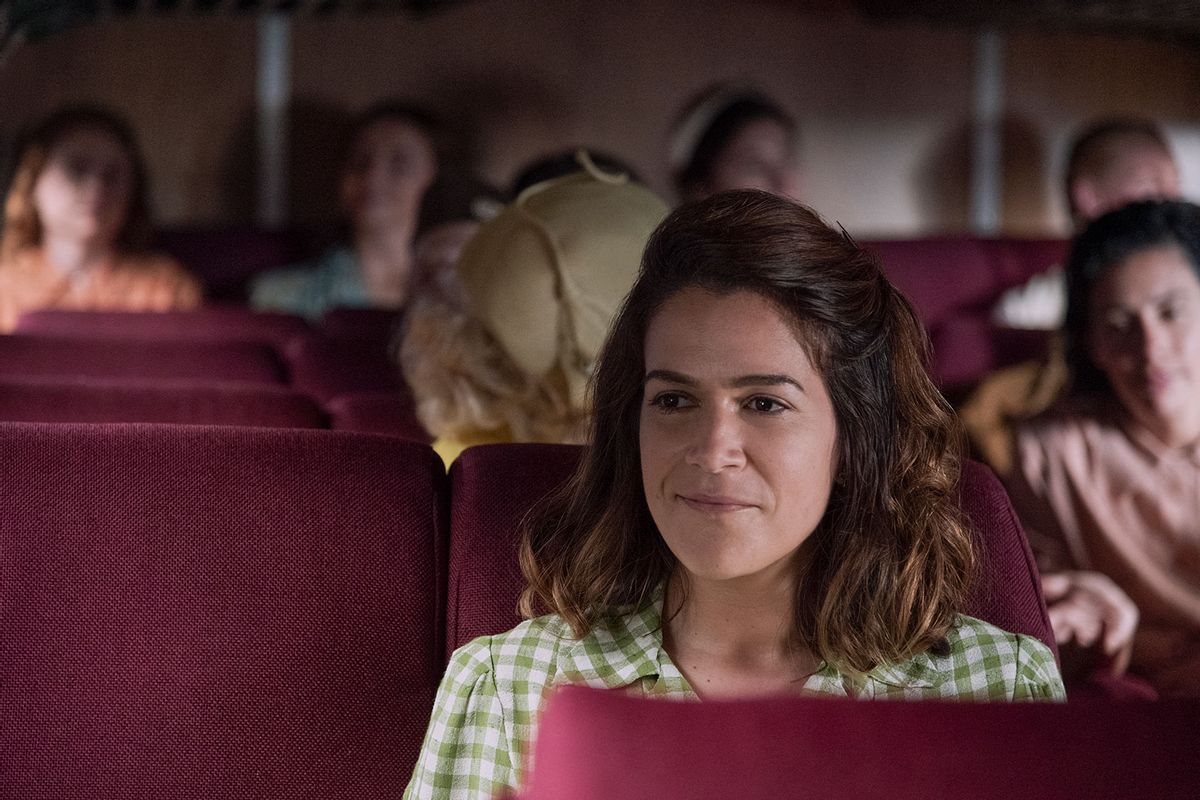
Shares